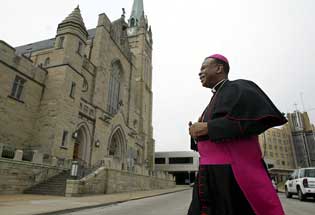By Tim Townsend
St. Louis Post-Dispatch
January 23, 2008
http://www.stltoday.com/stltoday/news/stories.nsf/religion/story/B74350DE3F3A4633862573D900192570?OpenDocument
Belleville Bishop Edward Braxton apologized Tuesday for spending about $18,000 from restricted diocesan and Vatican funds, and said he'd "secured a gift that will replenish" both funds.
But his priests, while hopeful, said Braxton will need to do more than apologize to restore their trust. They said they plan to hold the bishop to a pledge he made Tuesday to work more closely with his finance council "to ensure that such a problem does not occur again."
 |
| Bishop Edward K. Braxton Photo by Gabriel B. Tait |
Last week, the Post-Dispatch reported that Braxton had bought vestments for an ordination of two priests at St. Peter's Cathedral in Belleville, using about $8,000 in donations to a Vatican fund called the Propagation of the Faith. The fund is strictly dedicated to international mission work.
Last year, Braxton also authorized the purchase of a conference table and chairs for the Belleville chancery's conference room with $10,110 from a diocesan fund to maintain the diocese's buildings. That fund was part of a larger, diocesanwide campaign called A Future Full of Hope.
Both the diocese's chief financial officer and chancellor "expressed in writing their objections to this expenditure," according to the minutes of a Nov. 20 teleconference of the advisory board for A Future Full of Hope. "Bishop Braxton responded to them that it was his 'prudential judgment' to spend the money this way," the minutes continued.
Statutes issued by the Vatican and authorized by the pope strictly govern the flow of Propagation of the Faith money from dioceses to the fund's New York headquarters, and on to Rome. "Offerings given by the faithful for a specified purpose may be used only for that purpose," the statutes say.
A source on the finance council said the Propagation of the Faith money Braxton spent on vestments came from a single bequest, not a parish collection.
The bishop called an emergency teleconference of his 16-member finance council Monday and issued a statement Tuesday morning.
Last month, every member of the finance council signed a letter to Braxton, expressing concern about the expenditure, and sent a copy of the letter to the papal nuncio, the pope's representative in Washington.
Braxton did not name the donor Tuesday, but he said the donation will replenish both funds completely. In his statement, the bishop said that while the gift puts the matter of his use of unrestricted funds to rest, "it does not resolve the larger question of the confusion, mistrust, misunderstanding, loss of confidence, and even anger caused by these developments. I regret this very much, and I apologize for anything I may have done, even unwittingly, to contribute to this situation."
For months, the bishop has refused to answer questions from the Post-Dispatch about the matter, and he continued that stance Tuesday. He said through a spokesman that his statement would be his only communication about the vestment issue.
|
The Rev. Jerry Wirth, head of the diocese's presbyteral council, or clergy leadership, said in a statement that the council welcomed Braxton's apology but that "much has yet to be done to resolve the crisis of leadership."
"We thank him for addressing the immediate issue of expenditures of money," said the statement. "It however begs the question why he thought he could act unilaterally in purchases and in expenditure of money."
The Rev. Phillip Brown, assistant professor of canon law at Catholic University in Washington, said "there's no automatic sanction" for Braxton's use of Vatican funds for diocesan purposes. He said that while the situation is clearly on Rome's radar, it was more likely that Vatican officials "would engage in fraternal correction," rather than penalties.
"That might sound soft to people, but when someone in a position like that issues a public apology, there's a certain element of embarrassment involved," said Brown. "For someone in a high position, that's a pretty difficult thing to experience."
Canon law requires that bishops consult with their finance councils. "Canon law tries to encourage a free flow of dialogue between bishop and advisers in order to avoid just this kind of conflict," said Brown. "It tries to get people to work together toward common goals instead of having a bishop going his own way and being very authoritarian on things."
Braxton's priests said they were hopeful about the bishop's renewed commitment Tuesday "to act in complete fidelity to the doctrine and discipline of the Catholic Church ... ."
"We are very hopeful that this crisis can be slowly resolved over the coming months when the bishop continues to take the necessary steps to restore trust," they wrote. "Otherwise his recent statement and actions will be the efforts of a classic corporate damage control."
Contact: ttownsend@post-dispatch.com | 314-340-8221
Any original material on these pages is copyright © BishopAccountability.org 2004. Reproduce freely with attribution.